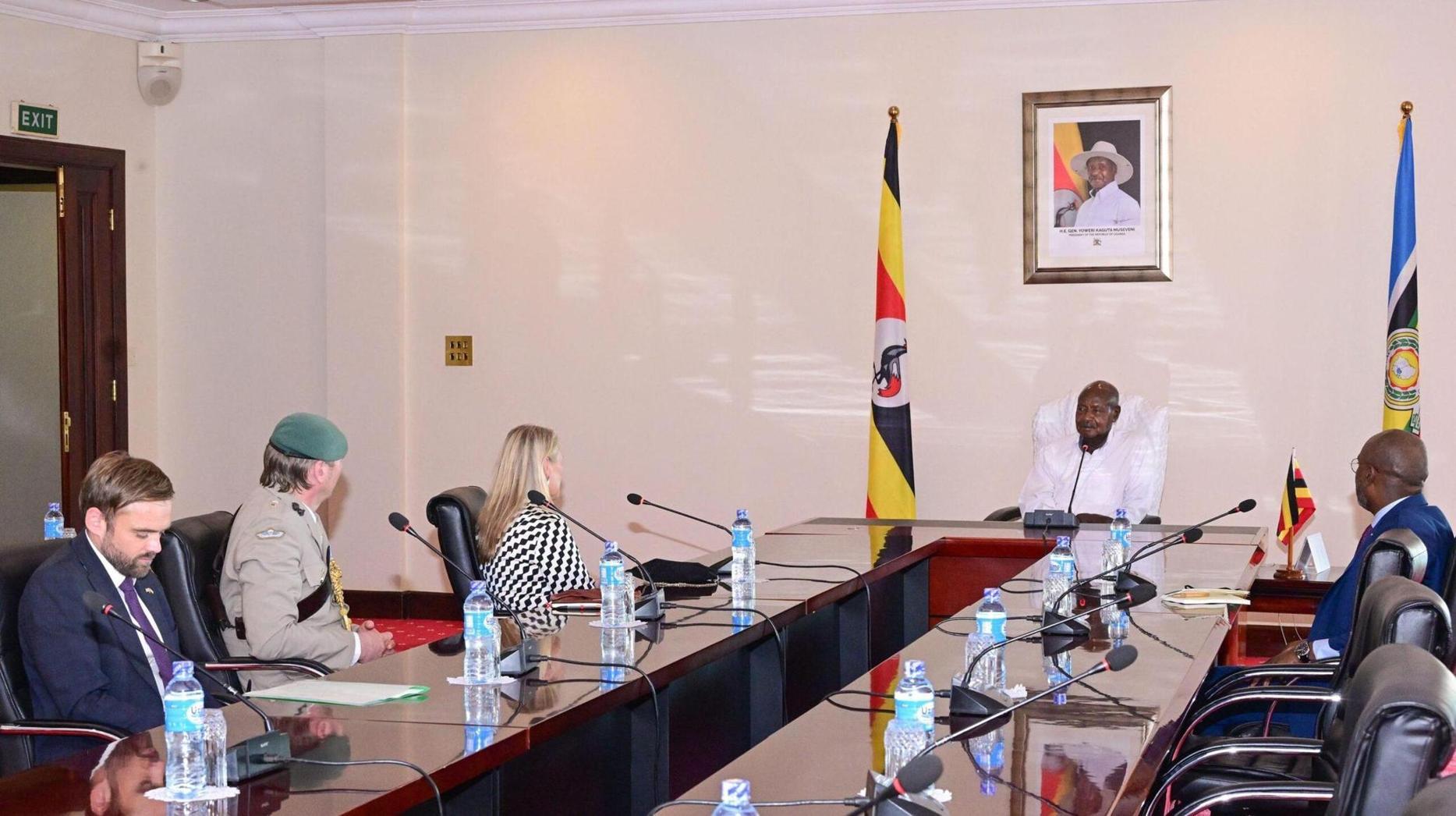By Faridah N Kulumba
Africa-Press – Uganda. Recently Uganda’s’ Minister of Foreign Affairs, General Jeje Odongo Abubakhar, held a meeting with H.E. Lisa Chesney, the High Commissioner of the United Kingdom to Uganda, at the Ministry’s headquarters in Kampala. The discussions followed the British high commissioner paying a courtesy visit to the Minister of Foreign Affairs. The British High Commission in Uganda maintains and develops relations between the UK and Uganda. The mission is responsible for the political relationship between the UK and Uganda and provides advice and guidance on political and governance issues.
Aim of the discussions
The meeting aimed at strengthening diplomatic ties between Uganda and Britain. The discussions focused on bilateral issues of mutual interest between the two governments, including peace and security developments in the Great Lakes region. On 30th April 2024, the two nations relations got a crack after the UK government’s Deputy Foreign Secretary, Andrew Mitchell announced sanctions on Anita Annet Among the speaker of the parliament of the government of Uganda and two lawmakers, Goretti Kitutu and Agnes Nandutu, over corruption allegations. The three sanctioned lawmakers were subject to travel bans and asset freezes under the UK’s Global Anti-Corruption sanctions regime.
The UK sanctions happened after the Ugandan parliament that was presided over by Speaker Among passed a law in May 2023, prescribing life and death sentences for certain acts of homosexuality, a move strongly criticized by some Western countries, including Britain. The parliament accused the British government of distorting facts to suit its political agenda. Uganda reacted by asking Britain to stop meddling in the local politics of the East African country. The Ugandan parliament urged Britain to respect the country’s sovereignty. The statement issued by the parliament of Uganda said that it is important that foreign partners, including Britain, respect the sovereignty of Uganda and avoid the temptation to meddle in our local politics, including arm-twisting decision makers to align with their value system, especially homosexuality.
What ties the UK and Uganda
British colonization of Uganda began around 1860. In 1888 Britain assigned political and economic power over the region to the British East Africa Company by royal charter. The Company’s control over the area was consolidated in 1891 when a treaty was signed with the Buganda, then the area’s principal kingdom. In 1894 the British government assumed power, declaring Baganda a protectorate. This protectorate was expanded in 1896 to include other regions. Uganda was ruled by the British beginning in the late 1800s and it gained independence in Oct. 9, 1962.
Uganda and the UK share strong historical, cultural, and economic ties, stemming from Uganda’s time as a British protectorate until its independence. These ties are reflected in ongoing collaboration on development, trade, and cultural exchange, with the UK being a significant development partner for Uganda. Development- Britain is a major development partner, working with Uganda on various initiatives to reduce poverty and promote sustainable development. During one of her visits in Uganda the British High Commissioner to Uganda pointed out that business development is a critical pillar of the UK-Uganda partnership, emphasizing that a “rising tide lifts all boats” as both countries pursue mutual economic opportunities.Trade cooperation- Over 100 UK companies operate in Uganda, and the UK government provides support for trade and investment between the two nations. There is also a growing trade relationship, with total trade in goods and services reaching £478 million in 2022.
On 7th August 2024, the British Chamber of Commerce Uganda (BCCU) was officially launched in Uganda marking a significant milestone in the country’s business landscape. It was launched in an East African country to promote trade and investment.BCCU aims to promote better trade links between the UK and Uganda. The BCCU acts as a collective voice and the business community’s influence to engage in trade policy, reduce barriers to entry and increase trade and investment, ultimately fostering economic growth. The Chamber’s purposes include networking opportunities, business advocacy, educational seminars, and exclusive member benefits, and to empower UK businesses in Uganda of all sizes to prosper. Security ties- the two countries cooperate in military and security issues, including educational exchanges and training programs. The UK’s Sandhurst Military Academy plays a significant role in training Ugandan officers, strengthening the bilateral relationship and enhancing the UPDF’s capabilities. Membership- Both nations are members of the Commonwealth, fostering continued cooperation and shared values.
Is Uganda independent?
Uganda gained independence from British colonial rule in 1962. Although the East African country is no longer under direct British rule, however the social, economic, and political structures established during the colonial period continue to influence the country. Uganda is still grappling with the long-lasting effects of colonial rule. The country has experienced significant political instability, violence, and economic challenges in the post-independence era, which are often attributed to the legacy of British colonialism. On 9th October 2025, Uganda will celebrate its 63 anniversary, however political analysts say that the country is not yet free from colonialism. British culture has had a significant effect on Ugandan culture, with many elements. Uganda’s official language is English, which is spoken by most educated Ugandans. Uganda, is working towards greater self-reliance and reducing dependence on former colonial powers.
For More News And Analysis About Uganda Follow Africa-Press






